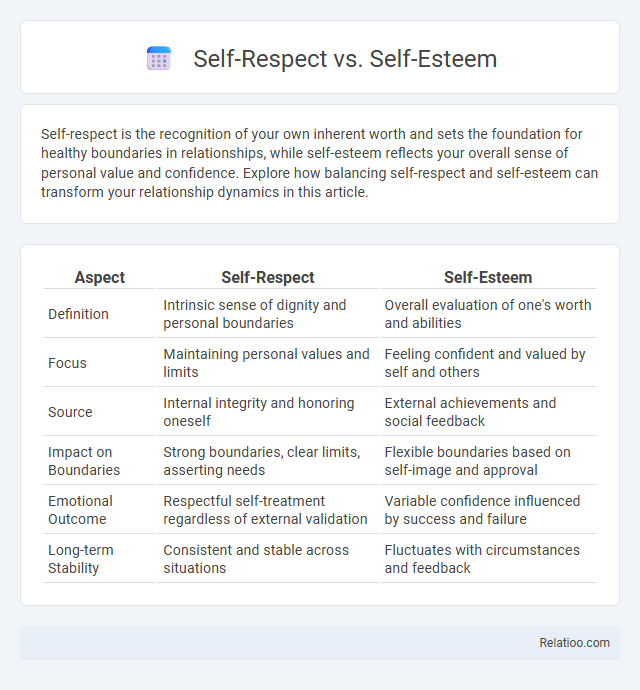Self-respect is the recognition of your own inherent worth and sets the foundation for healthy boundaries in relationships, while self-esteem reflects your overall sense of personal value and confidence. Explore how balancing self-respect and self-esteem can transform your relationship dynamics in this article.
Table of Comparison
| Aspect | Self-Respect | Self-Esteem |
|---|---|---|
| Definition | Intrinsic sense of dignity and personal boundaries | Overall evaluation of one's worth and abilities |
| Focus | Maintaining personal values and limits | Feeling confident and valued by self and others |
| Source | Internal integrity and honoring oneself | External achievements and social feedback |
| Impact on Boundaries | Strong boundaries, clear limits, asserting needs | Flexible boundaries based on self-image and approval |
| Emotional Outcome | Respectful self-treatment regardless of external validation | Variable confidence influenced by success and failure |
| Long-term Stability | Consistent and stable across situations | Fluctuates with circumstances and feedback |
Understanding Self-Respect: Core Principles
Self-respect centers on recognizing one's intrinsic worth and maintaining personal boundaries that honor this value, contrasting with self-esteem, which relates more to how one evaluates their abilities and worth based on external achievements. Core principles of self-respect include integrity, accountability, and adherence to personal values regardless of external validation. Developing self-respect fosters resilience and authentic self-expression, serving as a foundation for healthy relationships and emotional well-being.
What Is Self-Esteem? Key Definitions
Self-esteem is the overall sense of personal value and self-worth that influences how you perceive and interact with the world. It encompasses confidence in your abilities, self-respect, and the belief that you deserve happiness and success. Understanding self-esteem is crucial for improving mental health, decision-making, and cultivating positive relationships.
Self-Respect vs Self-Esteem: Main Differences
Self-respect refers to the regard you have for your own intrinsic worth, emphasizing adherence to personal values and boundaries, while self-esteem focuses on your overall evaluation of self-worth and confidence. Self-respect is more stable and tied to integrity, guiding your decisions and behavior, whereas self-esteem can fluctuate based on achievements or external validation. Understanding these differences helps you cultivate a healthier mindset, balancing inner dignity with positive self-view.
The Origins of Self-Respect and Self-Esteem
The origins of self-respect lie in the consistent alignment of your actions with your personal values and ethical standards, fostering a sense of inner dignity and integrity. Self-esteem, however, emerges from external validation, achievements, and social acceptance, influencing how you perceive your worth in relation to others. Understanding these distinct foundations highlights the critical role of internal consistency for self-respect and external feedback for self-esteem.
How Self-Respect Influences Behavior
Self-respect forms the foundation of your behavior by fostering a sense of personal dignity and worth, guiding you to set healthy boundaries and make decisions aligned with your values. Unlike self-esteem, which reflects how you evaluate your abilities or achievements, self-respect directly influences how you treat yourself and others, promoting consistency in your actions. This internal regard for yourself drives ethical behavior, resilience against negative influences, and the courage to stand up for your principles.
Signs of Healthy Self-Esteem
Signs of healthy self-esteem include a balanced self-view, resilience to criticism, and the ability to set boundaries, reflecting genuine self-respect. People with strong self-respect prioritize their values and maintain personal integrity, which reinforces their overall self-esteem. Unlike self-respect that centers on honoring one's principles, self-esteem encompasses emotional evaluation and confidence in one's worth and abilities.
The Role of Boundaries in Self-Respect
Self-respect is deeply connected to setting and maintaining clear boundaries that protect your values and well-being, distinguishing it from self-esteem, which relates more to how you evaluate your worth. Boundaries serve as a vital framework for upholding self-respect by ensuring others treat you with the respect you deserve, reinforcing your sense of dignity and personal integrity. Cultivating strong boundaries helps prevent self-neglect and promotes healthier relationships, directly impacting your overall self-respect and emotional health.
Building Lasting Self-Esteem: Strategies
Building lasting self-esteem involves cultivating a balanced sense of self-worth that goes beyond superficial achievements. Your focus should be on developing genuine self-respect through consistent self-care, setting healthy boundaries, and practicing positive self-talk. Prioritizing these strategies helps create a resilient foundation for self-esteem that endures challenges and reinforces your value intrinsically.
Common Misconceptions About Self-Respect and Self-Esteem
Self-respect and self-esteem are often mistakenly treated as interchangeable, but self-respect relates to valuing one's own principles and boundaries, while self-esteem refers to the evaluation of one's worth or abilities. A common misconception is that high self-esteem means a person has self-respect, yet someone can have high self-esteem based on external achievements without maintaining healthy self-respect. Another frequent error is assuming self-respect conflicts with self-esteem, when in fact, balanced self-respect supports genuine self-esteem and emotional well-being.
Cultivating Both: Achieving Balance for Personal Growth
Cultivating both self-respect and self-esteem is essential for your personal growth, as self-respect involves honoring your values and boundaries, while self-esteem reflects your overall sense of worth and confidence. Balancing these concepts allows you to make healthy decisions and maintain a positive self-image, fostering resilience and emotional well-being. Developing self-compassion alongside these qualities supports a harmonious inner state, enhancing your ability to navigate life's challenges effectively.

Infographic: Self-respect vs Self-esteem
 relatioo.com
relatioo.com